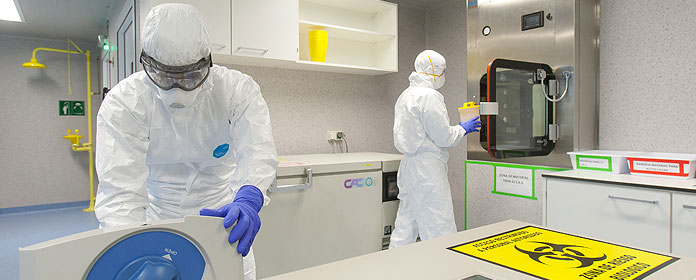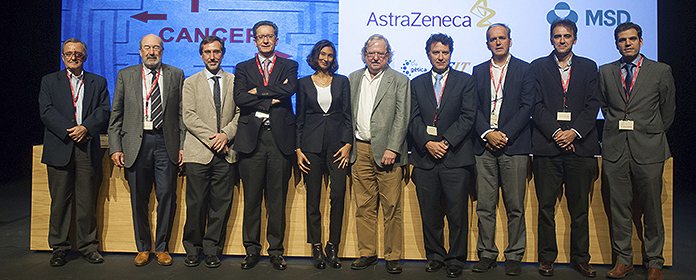20011102Jesús Prieto, profesor de la Universidad de Navarra, recibió el doctorado 'honoris causa' en Oporto
Jesús Prieto, University professor, received the doctorate honoris causa in Oporto.
Anibal Cavaco e Silva, former Prime Minister of Portugal, sponsored the researcher in gene therapy.
Professor Jesús Prieto, director of the department of Internal Medicine of the University Clinic and Full Professor of General Pathology of the University of Navarra, received the doctorate honoris causa from the University of Porto. The former Prime Minister of Portugal, Anibal Cavaco e Silva, sponsored the researcher in a ceremony that was also attended by personalities from the academic world, as well as family and friends of the recipient.
position The University of Navarra was represented by President, José Mª Bastero, and the Dean of the School of Medicine, Mª Pilar Civeira. During the ceremony, which the new honorary doctor defined as "a call for continuity in the common effort to make a better medicine", he praised the excellent relationship between the Departments of Internal Medicine, Gastroenterology and Hepatology of both educational centers. core topic Along the same lines, he considered the figure of Dr. Eduardo Ortiz de Landázuri, who, like many of the members of the Internal Medicine section of the University of Porto, was a disciple of Professor Carlos Jiménez Díaz, to be a factor in the twinning.
On the other hand, the expert affirmed that the common work of those who collaborated with him in the creation of the Division of Hepatology and Gene Therapy of the University of Navarra shows that the growing specialization of knowledge forces each person to depend more and more on others. "There is little that can be done by man alone, imposing a way of working where efforts, knowledge and skills are complemented in a framework multidisciplinary ", he explained. Recalling the message of Blessed Escrivá, founder of the University of Navarra, Dr. Prieto considered healthy respect for creativity and freedom as another essential basis "for initiating and continuing far-reaching scientific and educational projects.
Science, an instrument of solidarityThe specialist framed the eagerness for the expansion of the scientific knowledge in the need to "make science for man", an aspiration that he characterized as "one of the great challenges of the University of the new millennium". "It is necessary, today more than ever, to give science its authentic meaning, converting it not into a means for the domination of peoples, but into an instrument for solidarity among men and the dignification of the human person," he added.
In addition, he described his facet of researcher at the University of Navarra as inseparable from his healthcare work at the University Clinic. "I have been driven by the desire to investigate the mechanisms involved in the genesis and the development of pathological processes, guided mainly by the interest of making therapeutic contributions to diseases where present medicine is not operative".
On the other hand, he appealed to his audience to stress the importance of gratitude in all spheres of life, including the professional sphere: "In the biography of each one of us, divine Providence, the effort staff and the intellectual, material and affective contributions that others make to us throughout our lives are intertwined".


